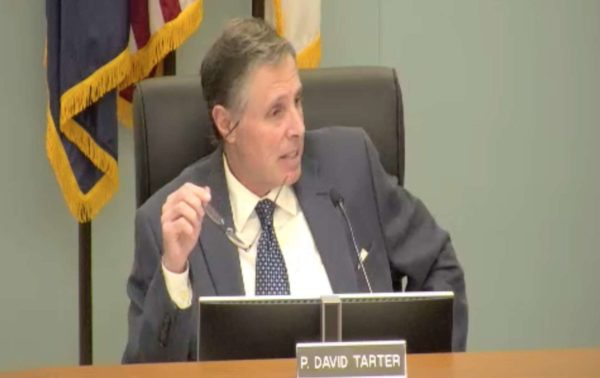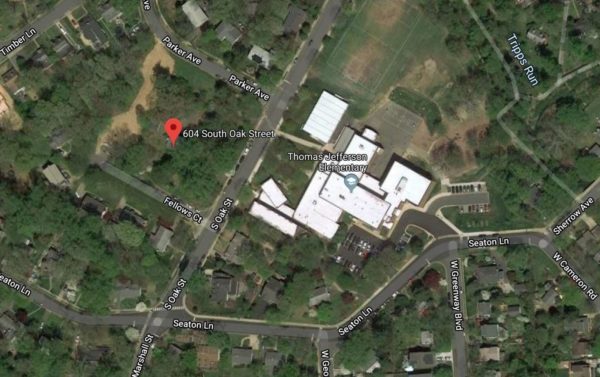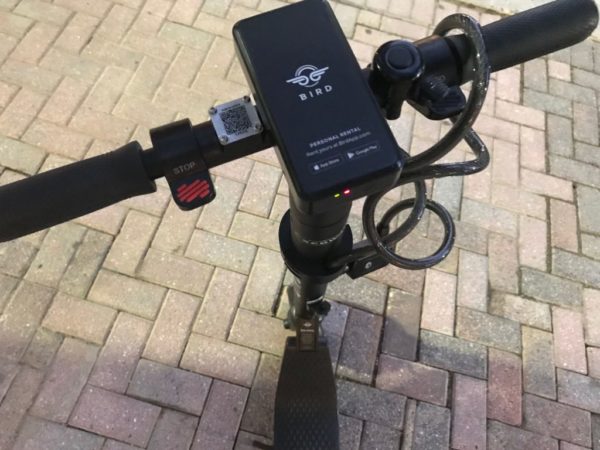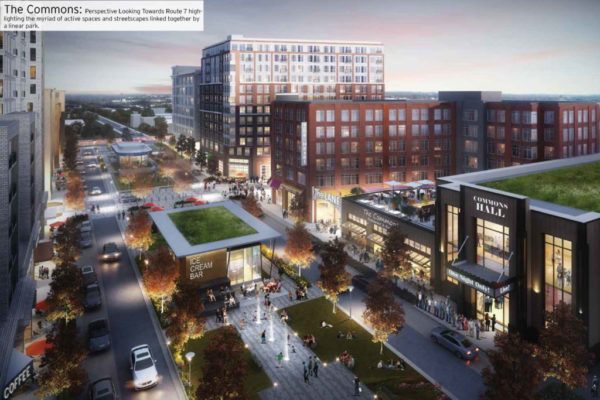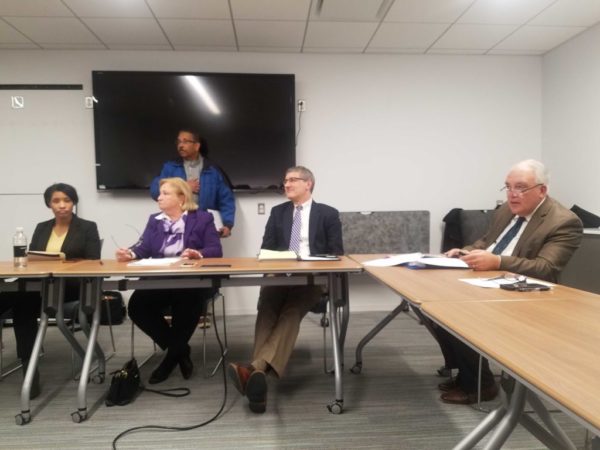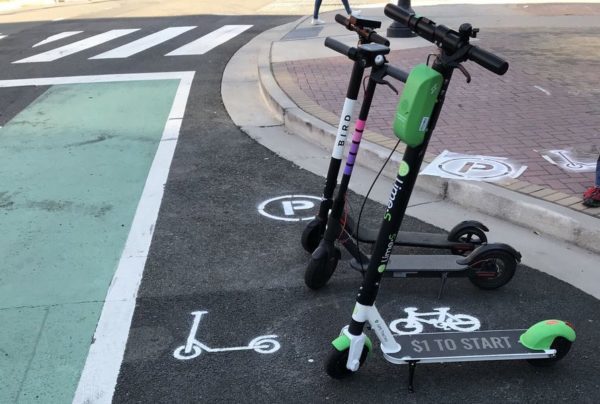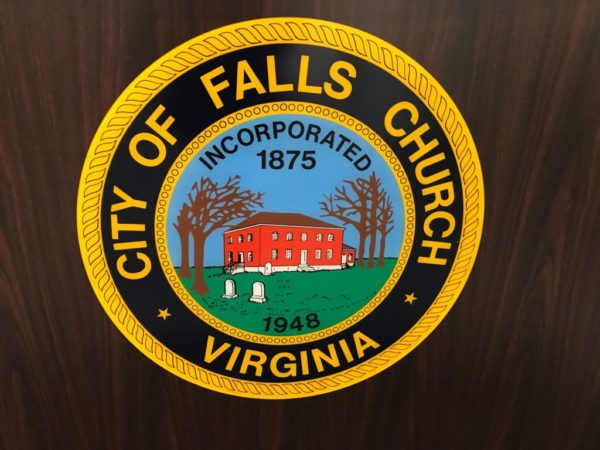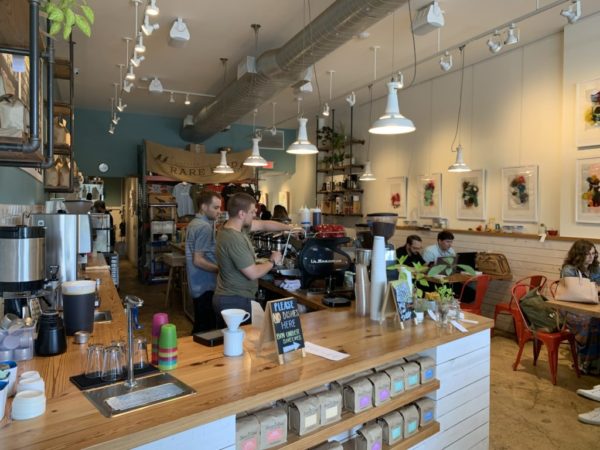The Falls Church City Council re-elected Mayor David Tarter and Vice Mayor Marybeth Connelly.
Both were re-elected unanimously at last night’s meeting.
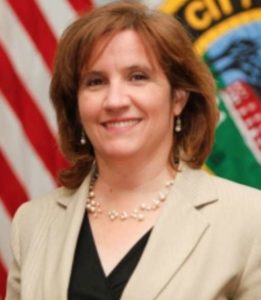 “Falls Church is a great community that we all love but our city is not standing still,” Tarter said, adding that the new high school and infrastructure changes will improve the city. “I am optimistic for the future.”
“Falls Church is a great community that we all love but our city is not standing still,” Tarter said, adding that the new high school and infrastructure changes will improve the city. “I am optimistic for the future.”
Tarter was first elected to the Falls Church City Council in July 2012 and has been been the city’s mayor since 2014, according to his city bio.
Connelly was first elected to the council in 2014 and has been the vice mayor since 2016, according to her city bio.
Tarter said that Connelly’s “collaborative approach to solving problems brings out the best in everyone.”
Images via City of Falls Church
Nearly two acres of land next to Thomas Jefferson Elementary School could become anything from community gardens to a public park.
Officials have hired a contractor to demolish the property at 604 S. Oak Street, kicking off the process to reclassify the 1.95-acre parcel from “low-density residential” to “parks and open space,” the city said in a press release.
“The land came into play following the passing of its long-time occupant, Betty Fellows, and moves by their heirs to subdivide it with an eye to multiple residential home uses,” the Falls Church News-Press reported.
Per city officials, the land is not on the official registry of historic homes in the city.
In the press release, officials stated that “staff worked with both local and regional organizations to determine ways to deconstruct or salvage any items of value.”
Once the land is cleared, it will be added to the Master Park Planning process, which will begin in the spring of 2020.
The land leaves the city with a plethora of options — it could become either open space, a public park, a new school or a community garden, among other options. Members of the public are invited to become involved and share input.
“Parks, open space, and recreational facilities are critical components of a community’s quality of life and the health of its citizens,” city officials said in a statement. “Parks provide social, environmental, and economic benefits.”
The city is also in the process of updating the nearby Oak Street Bridge after it was damaged from flooding in July.
Image via Google Maps
Starting next year, motorized scooters will be able to go up to 8 miles per hour in the Maple Avenue and Nutley Street corridors.
The General Assembly passed legislation earlier this year allowing localities to regulate motorized scooters and skateboards before Jan. 1.
The Vienna Town Council approved last night (Monday) a one-year pilot program for shared mobility devices, which include motorized scooters, ahead of the end-of-year deadline.
The devices will be able to go up to 8 mph on the Nutley Street and Maple Avenue corridors and in areas adjacent t0 schools, parks and recreation centers. On side streets, the devices will be able to go up to 20 mph.
Town staff said that it is anticipated that people will use the devices on the sidewalks on Nutley and Maple and in the road on the side streets.
Each operator will be required to pay a $5,000 fee to the town and be capped at 150 vehicles per the mode of transportation — motorized scooters or bikes — for each company.
Currently, the town has not capped the number of companies.
The West Falls Church Economic Development Project in the Little City has updated plans, including a new design for the hotel.
The Falls Church City Council held a joint work session with the Planning Commission and Economic Development Authority on Monday (Dec. 9) to review progress and discuss project aesthetics.
A presentation by James Snyder, the city’s director of community planning and economic development services, explored how the new development will look in the community and revealed a variety of building styles and colors to break up block redundancy.
People can expect numerous trees to be included in the final project, rooftop greenery, a grocery store, hotel, a new high school, senior living homes, family housing, shops and pedestrian-friendly walkways in the development, according to the presentation.
It has not been announced which hotel or grocery store will move into the space, but a commissioner said the announcement should be made either in the spring or summer of 2020.
Images and blueprints from the presentation primarily featured grey and white brick buildings with red, light wood and metal accents. Architects and designers said they looked toward New York and D.C. for industrial design ideas.
“The biggest change is the hotel. We heard everybody’s feedback that time that they were not thrilled with the hotel design, so we have started in a new direction,” another representative said.
The plans are expected to remain somewhat consistent throughout the next ideation phases, except for the senior living center, according to Snyder, who added that the Planning Commission is still awaiting development plans from the senior living facility.
“I like the geometric forms and modern architecture,” Planning Commission Chair Russell Wodiska said. “That’s a new look for Falls Church.”
Going forward in January, the next steps will be to work on creating a sense of community in the development, another commissioner said.
This Thursday (Dec. 12), community members are welcome to attend an event at the Town Hall (300 Park Avenue) from 7-9:30 p.m. where they will be able to learn more about the project and share their comments.
Image via City of Falls Church
Meetings to decide the fate of the Northern Virginia Juvenile Detention Center kicked off last night in Falls Church.
About two dozen people gathered last night at the Falls Church City Hall (300 Park Avenue) for the first of three regional meetings to get input on what should happen to the facility.
The center currently serves Falls Church, Arlington and Alexandria as a detention facility for kids deemed a flight risk while awaiting trial or a danger to themselves or others. But since juvenile incarceration rates have fallen more than 72% since 2006, according to a spokesperson for the Moss Group, the center no longer fills its 70-bed capacity.
Community leaders commissioned a study by the Moss Group to evaluate the efficiency of the center and options for its future.
Currently, there are 27 kids held in the facility, Johnitha McNair, the executive director of the center, said. Options include closing the center, remodeling it or simply cutting down on staff and bed size.
Attendees included curious community members from Arlington, Alexandria and Falls Church, board members who run the center, representatives from the NAACP, members of the Falls Church City Council, an American University student and professional child advocates.
A spokesman from the NAACP said he is concerned about what will happen if the center is closed, noting that the numbers may rise and fall throughout the years, potentially leaving the three cities in a conundrum if incarceration rates rise again.
Several attendees brought up issues not with the capacity issues of the facility, but rather with how the facility is run and how the physical design might impact the kids being held within.
Attorney Juliet Hiznay, who has been practicing law in the realm of education law and has experience helping children with special needs, said she toured the facility in 2018 and was disheartened by what she saw. She said she doesn’t think that the detention center can be repurposed without extreme structural changes.
“My concern is not about the goodwill of the people running the facility, but the physical limitations of the facility itself,” she said, adding that the cell-block structure of the center is poorly designed for kids. “I find it hard to believe it could be repurposed for any type of therapeutic intervention.”
Hiznay said there were few windows in the facility that allowed for suitable sunlight, limited mobility within in the center, very few opportunities for kids to get exercise and fresh air and that the kids she interacted with seemed desperate for attention.
McNair, the center’s director, countered a few of Hiznay’s statements through, saying that kids in the detention center have “ample” time to play outside and interact with one another. NcNair also said that there are at least two 12″ by 48″ windows in each cell room and that kids are kept busy throughout the day with activities such as group therapy, social rehabilitation programs and reentry initiatives.
There was discussion throughout the evening about redesigning the center to include a more open “dorm-style” floor plan that are seen in other detention facilities, which would stop queuing when kids try to enter new rooms, but experts at the meeting expressed potential security concerns around this idea.
Moss Group representatives at the meeting said they work with an architect who can advise city officials on their options to remodel the center.
“We work very hard to recognize that our clients are children,” McNair said at last night’s meeting, adding that she hopes to keep the center in operation and is open to structural changes that would allow the center to rethink its approach by making programs more focused on mental health and constructive development.
Mental health and the ability to better assist kids that walk through the center’s doors came up several times throughout the meeting.
McNair said that the staff noticed that a lot of the young women were acting up around 8 p.m. when they were supposed to go to bed. After some thinking, they realized that this was because bedtime was when a lot of the girls in the center experienced abuse at home and were possibly experiencing symptoms of post-traumatic stress disorder and anxiety.
“We already know the percent of kids going into these facilities with trauma and mental health issues are very high,” Hiznay told Tysons Reporter in an interview after the public hearing.
Now, two more similar public hearings will be held in Alexandria (Lee Center Exhibit Hall, 1108 Jefferson Street) next Wednesday (Nov. 20) from 7 to 8:30 p.m. and in Arlington (Central Library Auditorium, 1015 N. Quincy Street) next Thursday (Nov. 21) from 7 to 8:30 p.m.
People who cannot attend the meeting can fill out an online survey.
The final report from the Moss Group is set to come out in January. The Alexandria, Falls Church and Alexandria governments will review it in February and March. It is unclear when a final plan for the center will be announced.
The Falls Church City Council clashed over whether or not to allow motorized scooters on city sidewalks.
Councilmembers voted unanimously on Tuesday (Nov. 12) to continue working on the plan that would allow motorized scooter companies to take a test drive in Falls Church. But the vote was split 4-3 when it came to banning people from using such mobility devices on sidewalks, with the exception of Routes 29 and 7.
The safety of scooter riders and pedestrians was the top concern for city councilmembers as they discussed the implications of banning scooter riders on sidewalks.
Councilmember Phil Duncan, who voted in favor of banning scooters from sidewalks, said that cars should be mindful of scooters on the road and that riders should use bike lanes whenever possible.
Duncan noted a finding from the staff report, which claimed that scooter riders ranked sidewalks as their least favorite place to ride.
The city council decided to allow exceptions on Routes 29 and 7 based on safety findings from a staff report.
Councilmembers Letty Hardi, Ross Litkenhous and Marybeth Connelly voted against the ordinance to ban scooters on sidewalks.
“Preventing people from riding where they feel safe would just make this mode of transportation a non-starter. It would make this pilot pointless,” Hardi said.
Councilmember Connelly echoed Hardi’s concerns, but pushed for a compromise.
“We are assuming we are protecting the walkers on the sidewalks by saying ‘no scooters,’ but not protecting the scooter riders, who are also our neighbors, by saying they must ride always in the street,” she said.
Instead, she suggested adding another ordinance into the plan that would require scooter riders to give pedestrians the right of way on sidewalks. The city attorney present at the meeting noted that this was a viable idea but would require further discussion.
The city attorney suggested staff could work on a more efficient plan that would take her concerns into consideration.
“We have to have some assumption that the people in Falls Church who are using the scooters are not idiots,” Connelly said. “We have to rely on the judgment of the people using the scooters.”
The Falls Church City Council will review a second reading of the ordinance at their upcoming meeting on Dec. 9.
As the January deadline looms, the Falls Church City Council discussed proposals for e-scooters before state laws take effect and the city loses its chance to create regulations.
Concerns arose at both the Oct. 21 and Oct. 28 City Council meetings, including potential funding issues, underage use, parking and the upcoming pilot program. The pilot program would be limited to two scooter vendors, leaving companies to compete for a one-year trial period, Councilmember Ross Litkenhous said.
If implemented, the program would allow 14 scooters per 1,000 people into city limits. On average, the scooters would cost users $1 to unlock and a $0.25 per-minute fee, according to statistics gathered from Arlington and Alexandria.
On average 20% of e-scooter users ride them for social or entertainment purposes, while roughly 20% use them for shopping and errands. Another 20% use them to commute to the metro. Scooters could help to solve the first-to-last mile commuter problem, an expert brought in by the City Council and Councilmember Phil Duncan said.
There was some talk at the Oct. 21 meeting about using scooters to raise revenue for the city, by adding on taxes and unlocking fees. The city would charge each vendor an $8,000 permitting fee, regardless of fleet size, according to city documents. But no one seemed to have a concrete answer to the total profits.
“It would be interesting to see how much we can get out of it without impacting the demand,” Litkenhous said.
Councilmember Dave Snyder took another perspective, saying that it might cost the city more money. He said that police would be distracted by monitoring people, ensuring they are following laws and guidelines while riding the scooters.
Parking was yet another major focus of the conversations.
Several people suggested corrals, while others said that they encourage people to lean them against polls that are out of the way of pedestrians and cars. All of the councilmembers agreed that measures should be taken to ensure that they are not being left in the way of traffic or parked illegally in yards.
“Parking is going to be one of the major sources of complaints we will get, so we should prepare for that,” Councilmember Letty Hardi said.
Going forward, the Falls Church City Council will continue to discuss potential implementation plans before they make a final decision. At the next City Council meeting on Tuesday (Nov. 12), councilmembers are expected to discuss a first reading of the new ordinance regarding motorized scooters and shared mobility devices.
“I really think the success of this pilot is going to hinge on good communication,” Hardi said. “Lowering the bar to explain this won’t be perfect, [but] is important.”
The three incumbents for the Falls Church City Council — David Tarter, Phil Duncan and Letty Hardi — won reelection yesterday.
The city announced the official results today, saying that 45% of the 9,910 active, registered voters in the city voted in the election.
“The last ‘off-year election’ (with no federal or gubernatorial races on the ballot) was Nov. 3, 2015, where 42.1% of active voters participated,” the press release said.
Here are the results for the City Council race:
- Letty C. Hardi: 31.1%
- David Tarter: 30.3%
- Philip Duncan: 25.2%
- Stuart Whitaker: 12.5%
The councilmembers will be sworn in on Monday, Dec. 9, at 7:30 p.m. in Council Chambers (300 Park Avenue). The City Council will then vote on the mayor and vice mayor on Monday, Jan. 6.
For the city’s school board, Philip Reitinger was re-elected and will be joined by newcomers Susan Dimock and Laura Downs.
Here are the results for the school board race:
- Laura Downs: 31.5%
- Susan Dimock: 30%
- Philip Reitinger: 24.1%
- Douglass Stevens: 13.7%
Democrat Parisa Dehghani-Tafti was newly elected as the Commonwealth’s Attorney for Arlington County and the City of Falls Church.
An annual campaign in the City of Falls Church this month encourages locals to spend money locally.
The Falls Church #LiveLocalFC campaign invites community members to take advantage of stores and services within city limits while participating in social media challenges for prizes through the end of November.
There is a bingo card online that participants can complete and post on social media with the #LiveLocalFC hashtag to qualify them for weekly prizes, though it is not clear what the prizes will be. The bingo card presents challenges such as “meet a local business owner,” “have food delivered” and “support a non-profit.”
Residents are encouraged to have 20% or more of their shopping or monthly spending happen within the city.
Councilmember Ross Litkenhous began the campaign along with other councilmembers and the Falls Church Chamber of Commerce.
“Last year we kicked off the live local campaign,” Litkenhous said. “Those efforts really paid off.”
The city manager and chief financial officer said the sales and meal tax revenue from last year following the campaign exceeded expectations by over $750,000, according to Litkenhous.
The initiative offers other benefits, including economic development in the city, a boosted sense of community, increased funding for schools and infrastructure, easement of traffic, reduction of pollutants into the environment and creation of jobs, according to a press release.
November was chosen as #LiveLocal month because the holiday season is around the corner and many people are starting to shop for gifts, Litkenhous said.
In an ongoing effort to address flooding issues in the city, the Falls Church City Council approved a stormwater task force earlier this week.
The task force will work with city staff to update the list of priority projects for stormwater improvements in the Watershed Management Plan — sanitary backflows are not in the task force’s scope of work, according to the resolution.
More from the resolution:
What is envisioned with this task force is a rigorous, yet transparent set of criteria that will be used to grade projects. The mindset of the members of the task force must be to help the City as a whole grapple with the problems of flooding. The end result should be a ranking of projects in order of the most cost effective stormwater improvements that will protect the most people.
The task force will report to the City Council, City Manager Wyatt Shields said at the meeting on City Council meeting on Monday (Oct. 28).
Staff recommends that the task force consists of up to seven members, saying in the resolution that a larger size might make scheduling and attending meetings more difficult.
“There could be a liaison but we were not envisioning a city councilmember [on the task force],” Shields said.
Mayer David Tarter suggested that the task force include at-large members to prevent “regionalism” on the taskforce.
“I suspect that having people from each of the districts is probably a good idea,” Mayor David Tarter said. “If someone’s not represented, then they may feel like their interests aren’t being represented.”
The task force’s members are set to be determined before the end of the year.
“The idea is for the deadline for applications to be in mid-November so that we can get them to the Appointments Committee and then to City Council,” Shields said, adding that the goal is to get the appointments finalized by December.
The council voted 6-0 to approve the task force on Monday.
The task force is expected to end on July 1, unless extended by the City Council.
“There will be open meetings. Hopefully, a lot of the public will come to them so they can see the decision-making process,” Shields said.


